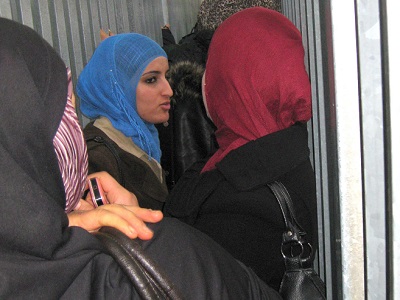
By Tamar Fleishman
It was the Second Holiday (the seventh day of Passover). Another two day of closure. Not many Palestinian come to the checkpoint when on days of closures.
A sleepy soldier, probably bitter because he had to stay at this evil place on the holiday, absentmindedly pushed the button to open and close the path. He opened it and closed it, and then again, he opened it and again closed it.
The minutes passed and people were waiting, time seemed be running out and the soldier remained aloof. To him, time was crawling. The minutes and the hours were all the same, and so were the people, they were all the same. A small group passed in front of him and then another group arrived. And he just pushed the button and then let it go. What’s the rush?
He let them pass in groups of three. Three and then he locked the gate. He waited. Opened it and then locked it. Even when this count caused a child to separate from his mother, he was on the inside while she remained outside and both of them were in a state of terror, the soldier didn’t hurry to unite the mother with her son.
“What can we do?- they have the button” one man said, an elderly who had experience with the system.
He was right. This button as well as other buttons are all under their control. The button that opens and the button that closes, the button that shoots and the button that makes the arrests. These are all buttons and they are all under their control.
But the much more grim truth was hidden from the eye, the DCO offices, where Palestinian receive (or do not receive) passage permits, were closed for four consequent days. And with Saturday being so close to the other holidays those in need of a permit were left helpless in front of locked doors and cold heartedness.
There was a gray sign with blue fonts:
On weekends and Jewish holidays
The DCO can be contacted on this number:
02-9703762
But salvation couldn’t be found there either. The calls were answered but no solutions were offered to the problems presented.
A father of a baby girl, who had “only three days before turning a month” (the father said), learned all this the hard way. A surgery for the infant was scheduled at Saint John Eye Hospital in east Jerusalem, and she had to be hospitalized on Monday, which was a holiday.
The father came to Qalandiya checkpoint to ask for a passage permit for his wife, so that she could take care for their daughter at the hospital and feed her. But the offices were closed. It was the eve of the holiday so there was a closure. He made a call to that number, he also called the health coordinator as well as the Physicians for Human Rights association.
– “Go to Zaitim checkpoint”, he was told, “that’s where you will get it”.
He went to Zaitim checkpoint, but it was also under a closure, the offices there were also closed. He stood outside, waiting and making phone calls to all those he had already called: “it’s being prepared” he was told. He waited for hours. He didn’t eat and he didn’t drink, “I’m just standing here burning cigarettes”, he said.
All the hotlines said that there was nothing to prevent his wife from getting the permit, it already exists on the computer, but the guy that issues the permits onto paper wasn’t there. And the Palestinians know that if they don’t have the papers in their hand- there is no permit. He kept waiting.
After more attempts and phone calls they promised the father that everything was going to be alright, that if on the next day, during the holiday, he would arrive with his wife and child, the soldiers would let them pass without the paper that he was supposed to get from the officer.
Doubt kept eating at him and troubling him during the night.
But in the morning something unbelievable happened- the soldiers at the checkpoint knew what to do and allowed the mother and her baby to pass without the paper.
What is taken for granted in any human society seems like a small miracle when you live under occupation.
Many thank to Hussam Liftawi and to Amal Ziada from Physicians for Human Rights for putting the time and the effort into opening the locked doors before that one baby who had only “three days before turning a month” and her mother.
(Translated by Ruth Fleishman)
– As a member of Machsomwatch, once a week Tamar Fleishman heads out to document the checkpoints between Jerusalem and Ramallah. This documentation (reports, photos and videos) can be found on the organization’s site: www.machsomwatch.org. The majority of the Spotlights (an opinion page) that are published on the site had been written by her. She is also a member of the Coalition of Women for Peace and volunteer in Breaking the Silence. She contributed this article to PalestineChronicle.com.





